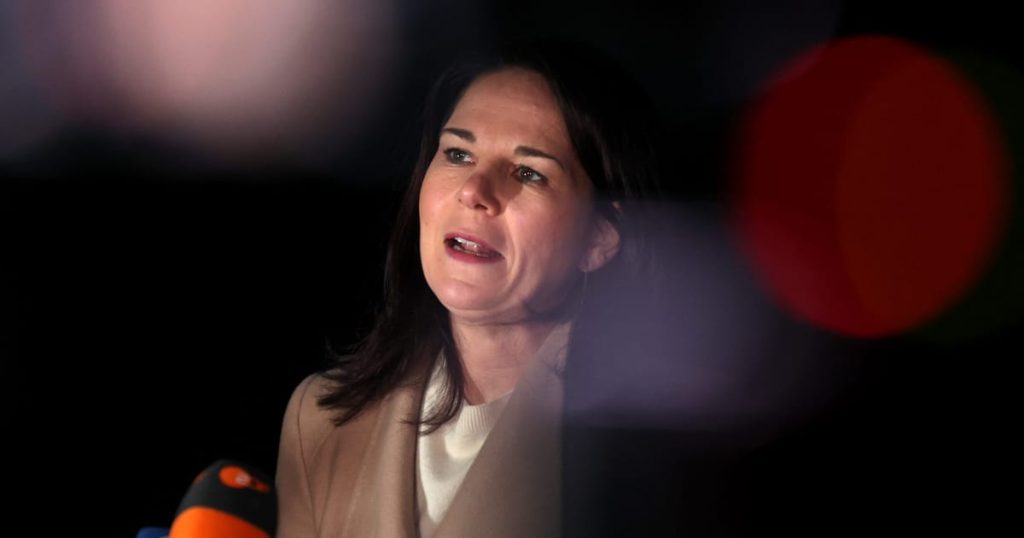The unexpected visit of Annalena Baerbock, the German Foreign Minister, and Catherine Colonna, her French counterpart, to Damascus marked the first visit by EU ministers since the dramatic overthrow of Bashar al-Assad’s regime by an Islamist rebel offensive in early December. Their arrival was met with an awkward and politically charged encounter with Ahmed Hussein al-Shar’a, also known as Abu Mohammed al-Golani, the de facto leader of the nascent Syrian government. Al-Shar’a, the head of Hayat Tahrir al-Sham (HTS), extended a handshake to Colonna but pointedly declined to offer the same gesture to Baerbock. This snub, captured on video and disseminated widely online, immediately fueled speculation and drew parallels to past diplomatic incidents involving perceived gender bias.
The context of this encounter underscores the complex and volatile situation in Syria. HTS, a former al-Qaeda affiliate designated a terrorist organization by several Western nations, including the US and the UK, has surprisingly emerged as the dominant force in the country. This rapid ascent has naturally raised serious concerns within the international community regarding the future of human rights, particularly the rights of women and minorities in a nation ravaged by years of conflict. For Baerbock and Colonna, addressing these concerns formed the core of their diplomatic mission. Their visit, therefore, represents a delicate balancing act: engaging with the new leadership to advocate for human rights while navigating the sensitive political landscape and the controversial nature of HTS’s leadership.
The denied handshake incident serves as a potent illustration of the challenges inherent in this diplomatic endeavor. It mirrors the “Sofagate” incident involving European Commission President Ursula von der Leyen in 2021, where she was left without a seat during a meeting with Turkish President Recep Tayyip Erdoğan. Both incidents underscore the complexities of diplomatic protocol and the potential for cultural misunderstandings or deliberate slights to overshadow substantive discussions. Furthermore, these incidents highlight the ongoing debate surrounding gender equality in international relations and the challenges faced by female leaders on the global stage. The refusal of a handshake, while seemingly a minor gesture, can carry significant symbolic weight, particularly in cultures where such gestures hold considerable importance.
The ministers’ visit aimed to assess the situation on the ground and engage with the new Syrian authorities. Despite the diplomatic awkwardness of the arrival, Baerbock and Colonna secured “assurances” from the new government regarding the inclusion of women and other marginalized groups in the forthcoming political transition. While the specifics of these assurances remain unclear, the ministers’ public statement suggests a degree of optimism, perhaps reflecting a pragmatic approach to dealing with a challenging situation. The international community remains wary of HTS’s past and will be closely monitoring the group’s actions to ensure these commitments translate into tangible improvements in the lives of ordinary Syrians.
The incident highlights the complexities of international diplomacy, particularly in situations involving entities with controversial backgrounds. The handshake snub, whether intentional or a product of cultural misunderstanding, emphasizes the delicate balancing act required when engaging with such actors. The EU ministers, while seeking to promote human rights and democratic values, also face the realpolitik of having to interact with a group designated as a terrorist organization by some of their key allies. This presents a difficult dilemma: how to address urgent humanitarian and political concerns without implicitly legitimizing a group with a questionable past.
Moving forward, the international community’s response to the evolving situation in Syria will be crucial. This response will need to address both the immediate humanitarian needs of the Syrian people and the long-term political stability of the country. Striking a balance between engagement and condemnation, between pragmatism and principle, will be essential in navigating this complex landscape. The visit by Baerbock and Colonna, despite its initial awkwardness, represents a first step in this process, providing a glimpse into the challenges and opportunities that lie ahead. The denied handshake serves as a stark reminder of the sensitivity required in these interactions and underscores the need for continued vigilance in upholding human rights principles throughout this precarious transition period in Syria’s history.














